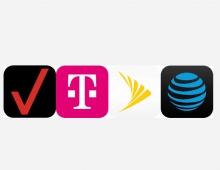
Justice Dept Approves Verizon-cable Deals
The Justice Department's antitrust division on Thursday approved deals between Verizon Wireless and four cable companies but applied conditions.
The agency will require Verizon and four of the U.S.' largest cable companies - Comcast, Time Warner Cable, Bright House Networks and Cox Communications
- to make changes to a series of agreements concerning both the sale of bundled wireless and wireline services, and the formation of a technology research joint venture. The department said that, if left unaltered, the agreements would have harmed competition by diminishing the companies' incentive to compete, resulting in higher prices and lower quality for consumers.
The department also said that it would allow both Verizon's proposed acquisitions of spectrum from the cable companies and T-Mobile USA's contingent purchase of a significant portion of that spectrum from Verizon to go forward. The department said that the spectrum transactions facilitate active use of an important national resource and thereby promise substantial benefit to wireless consumers. The transactions remain subject to review by the FCC, which is expected to release a separate statement regarding the status of its review of the transactions.
The department's Antitrust Division, joined by the New York State Attorney General's Office, filed a civil antitrust lawsuit today in the U.S. District Court for the District of Columbia to prevent Verizon, Comcast, Time Warner Cable, Bright House Networks and Cox Communications from enforcing a series of commercial agreements. At the same time, the department filed a proposed settlement that, if approved by the court, would resolve the concerns alleged in the lawsuit.
The department said the proposed settlement protects competition and consumers by removing provisions that would lessen the companies' incentives to compete aggressively in the areas where Verizon's FiOS services offer a critical competitive alternative to the cable companies' video and broadband products. The proposed settlement also limits the duration of the companies' collaboration to December 2016 in important respects, ensuring that they retain incentives to compete against one another .
In December 2011, Verizon Wireless agreed to acquire a significant portfolio of wireless spectrum licenses from a consortium of cable companies ' spectrum that today is unused. In June 2012, Verizon Wireless reached an agreement to transfer a significant amount of that spectrum to T-Mobile USA, the smallest of the four nationwide mobile wireless competitors. Verizon Wireless has also announced a public process to sell other previously unused spectrum.
At the same time they entered into the spectrum transactions, Verizon and the cable companies entered into a series of commercial agreements that require the companies to sell each other's products and create an exclusive technology research joint venture.
Verizon and the cable companies are direct competitors in many local markets throughout the United States where Verizon offers video, voice and broadband service. The series of commercial agreements between Verizon and the cable companies would have threatened this competition. The series of commercial agreements between Verizon and the cable companies would have threatened this competition. Most notably, the agreements, as originally structured, would have required Verizon Wireless to sell the cable companies' services on an 'equivalent basis' with FiOS where FiOS is available, thereby reducing Verizon's ability and incentive to sell its own services aggressively.
The agreements also create a new technology research joint venture through which Verizon Wireless, Comcast, Time Warner Cable and Bright House Networks would collaborate to develop new technologies that integrate wireless and wireline products. The department's complaint alleges that the potentially unlimited duration of this collaboration is unreasonable and could threaten long-term competition, and also alleges that certain restrictions in the agreements unnecessarily hinder the ability of the companies to innovate outside the joint venture.
The proposed settlement forbids Verizon Wireless from selling cable company products in FiOS areas and removes contractual restrictions on Verizon Wireless's ability to sell FiOS, ensuring that Verizon's incentives to compete aggressively against the cable companies remain unchanged. In addition, under the proposed settlement, Verizon Wireless's ability to resell the cable companies' services to customers in areas where Verizon sells DSL Internet service ends in December of 2016 (subject to potential renewal at the department's sole discretion), thereby preserving Verizon's incentives to reconsider its decision to stop building out its FiOS network and otherwise innovate in its DSL territory. Finally, the proposed settlement limits the duration of the technology joint venture and other features of the agreements, ensuring that the agreements will not dampen the companies' incentives to compete against one another going forward.
The proposed settlement also requires the commercial agreements to be amended so that:
- Verizon retains the ability to sell bundles of services that include DSL, Verizon Wireless and the video services of a direct broadcast satellite company (i.e., DirecTV or Dish Network);
- After five years, the cable companies are no longer barred from selling the wireless services of Verizon Wireless?s competitors, and may partner with other wireless providers;
- The cable companies can elect to resell Verizon Wireless services using their own brand at any time as provided for under the amended agreements; and
- Upon dissolution of the technology joint venture, all members receive a non-exclusive license to all the joint venture's technology, and each may then choose to sublicense to other competitors.
The settlement also forbids any form of collusion and restricts the exchange of competitively sensitive information. Verizon and the cable companies would also be required to provide regular reports to the department to ensure that the collaboration does not harm competition going forward.
The department also said that it would allow both Verizon's proposed acquisitions of spectrum from the cable companies and T-Mobile USA's contingent purchase of a significant portion of that spectrum from Verizon to go forward. The department said that the spectrum transactions facilitate active use of an important national resource and thereby promise substantial benefit to wireless consumers. The transactions remain subject to review by the FCC, which is expected to release a separate statement regarding the status of its review of the transactions.
The department's Antitrust Division, joined by the New York State Attorney General's Office, filed a civil antitrust lawsuit today in the U.S. District Court for the District of Columbia to prevent Verizon, Comcast, Time Warner Cable, Bright House Networks and Cox Communications from enforcing a series of commercial agreements. At the same time, the department filed a proposed settlement that, if approved by the court, would resolve the concerns alleged in the lawsuit.
The department said the proposed settlement protects competition and consumers by removing provisions that would lessen the companies' incentives to compete aggressively in the areas where Verizon's FiOS services offer a critical competitive alternative to the cable companies' video and broadband products. The proposed settlement also limits the duration of the companies' collaboration to December 2016 in important respects, ensuring that they retain incentives to compete against one another .
In December 2011, Verizon Wireless agreed to acquire a significant portfolio of wireless spectrum licenses from a consortium of cable companies ' spectrum that today is unused. In June 2012, Verizon Wireless reached an agreement to transfer a significant amount of that spectrum to T-Mobile USA, the smallest of the four nationwide mobile wireless competitors. Verizon Wireless has also announced a public process to sell other previously unused spectrum.
At the same time they entered into the spectrum transactions, Verizon and the cable companies entered into a series of commercial agreements that require the companies to sell each other's products and create an exclusive technology research joint venture.
Verizon and the cable companies are direct competitors in many local markets throughout the United States where Verizon offers video, voice and broadband service. The series of commercial agreements between Verizon and the cable companies would have threatened this competition. The series of commercial agreements between Verizon and the cable companies would have threatened this competition. Most notably, the agreements, as originally structured, would have required Verizon Wireless to sell the cable companies' services on an 'equivalent basis' with FiOS where FiOS is available, thereby reducing Verizon's ability and incentive to sell its own services aggressively.
The agreements also create a new technology research joint venture through which Verizon Wireless, Comcast, Time Warner Cable and Bright House Networks would collaborate to develop new technologies that integrate wireless and wireline products. The department's complaint alleges that the potentially unlimited duration of this collaboration is unreasonable and could threaten long-term competition, and also alleges that certain restrictions in the agreements unnecessarily hinder the ability of the companies to innovate outside the joint venture.
The proposed settlement forbids Verizon Wireless from selling cable company products in FiOS areas and removes contractual restrictions on Verizon Wireless's ability to sell FiOS, ensuring that Verizon's incentives to compete aggressively against the cable companies remain unchanged. In addition, under the proposed settlement, Verizon Wireless's ability to resell the cable companies' services to customers in areas where Verizon sells DSL Internet service ends in December of 2016 (subject to potential renewal at the department's sole discretion), thereby preserving Verizon's incentives to reconsider its decision to stop building out its FiOS network and otherwise innovate in its DSL territory. Finally, the proposed settlement limits the duration of the technology joint venture and other features of the agreements, ensuring that the agreements will not dampen the companies' incentives to compete against one another going forward.
The proposed settlement also requires the commercial agreements to be amended so that:
- Verizon retains the ability to sell bundles of services that include DSL, Verizon Wireless and the video services of a direct broadcast satellite company (i.e., DirecTV or Dish Network);
- After five years, the cable companies are no longer barred from selling the wireless services of Verizon Wireless?s competitors, and may partner with other wireless providers;
- The cable companies can elect to resell Verizon Wireless services using their own brand at any time as provided for under the amended agreements; and
- Upon dissolution of the technology joint venture, all members receive a non-exclusive license to all the joint venture's technology, and each may then choose to sublicense to other competitors.
The settlement also forbids any form of collusion and restricts the exchange of competitively sensitive information. Verizon and the cable companies would also be required to provide regular reports to the department to ensure that the collaboration does not harm competition going forward.





















